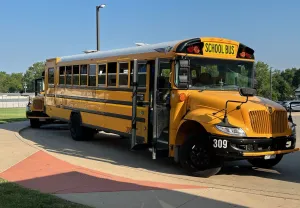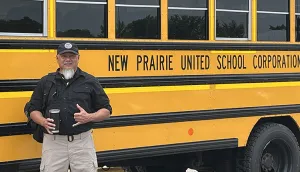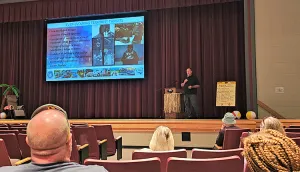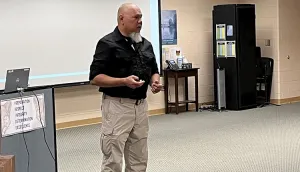 Bus 309 for the Joplin (Missouri) School District. (Adam Alford photo)
Bus 309 for the Joplin (Missouri) School District. (Adam Alford photo)
With the opening of classrooms this month across the country, school buses are back on America’s roads, and TSA is playing a significant role in keeping our buses and kids safe.
Indiana TSA Surface Inspector (TSI) Malcolm Duenas said school buses have limited security measures in place, making them vulnerable targets.
In addition to driving kids to and from school every day, Duenas said, “School buses could be at a stadium, museum, large gatherings, festivals and even at government buildings. Threat actors may see this as an opportunity to use a school bus to perform a terrorist act.”
That’s where TSIs, like Duenas and Adam Alford from the Kansas City Field Office, come into play. Duenas met this month with school bus drivers and members of the transportation team at northern Indiana’s New Prairie United School Corporation, while Alford spoke at a back-to-school professional development meeting for transportation operators in the Joplin School District in southwest Missouri.
“School buses are a trusted source of transportation for children and can be a vulnerability if someone wants to use the bus to do harm,” said Alford.
Alford and Duenas told school bus operators about TSA’s First Observer Plus™ program, which helps surface transportation professionals recognize suspicious activity, possibly related to terrorism, and do something about it.
“First Observer Plus is a security awareness training program based on how to ‘observe, assess and report’ possible suspicious activity in every surface mode of transportation,” Alford described.
“We use the program to inform frontline transportation employees of the importance of security,” added Duenas. “The employees learn how to identify something that is potentially suspicious, assess the situation, and learn the proper notification process to report it. First Observer Plus is a force multiplier, increasing the eyes and ears out on the front lines.”
The Transportation Departments in the New Prairie United and Joplin Schools reached out to TSA to educate their bus drivers and aides on advanced techniques for observing and preventing terrorist-related activities that could harm their students and communities.
“Our drivers have been asking for additional training,” said New Prairie United Transportation Director Lory Samford. “They are out on the road in all different locations and may see things that others do not.”
Samford said her school bus team left their meeting with some key takeaways.
“What to look for, what to do if you see something suspicious and who to contact,” she explained.
Duenas told the New Prairie United team they are the experts on the front lines of their routes and work areas and best know their environment. He said threats are real.
“There have been events where school buses have been targeted by hijackers and guns brought on board with children present,” said Duenas. “It is important that the frontline professionals are able to identify suspicious activity and report it to the proper officials.”
Duenas and Alford believe just prior to back-to-school time is the best time for TSA inspectors like them to work with school corporations across the country.
“This is a very busy time of year for those of us working with our school district partners,” Alford noted. “The summer allows for everyone to have an opportunity to gain some important training, refreshers on policies and procedures, and this is usually where we come in, providing security awareness trainings, assessments and exercises to their employees.”
What about school bus inspections?
“We recommend schools include pre-, mid- and post-trip security inspections into their already existing safety inspections,” Duenas replied. “We also conduct assessments to identify if drivers are conducting security inspections.”
TSA offers to partner with school districts on numerous types of assessments, exercises and training.
“We provide risk mitigation activities such as First Observer Plus; suspicious vs. unattended items; active shooter; improved explosive device awareness,” said Alford. “We provide a Baseline Assessment for Security Enhancement to evaluate a stakeholder’s current security posture and offer resources and recommendations to increase their security.”
The best part is TSA provides all the training for free.
“Unfortunately, many school districts have tight budget constraints, causing them to refrain from seeking training opportunities due to the cost,” Alford emphasized. “If school districts aren’t aware that TSA’s surface inspectors are available to them, they are missing out on the many great opportunities we provide.”
Alford and Duenas strongly believe everyone plays a key role in protecting our bus systems and students – parents, students, teachers, staff and administrators in addition to school bus operators. And they envision further expanding TSA’s strong security partnerships with the nation’s school corporations.
“School buses carry the most precious cargo in the transportation world,” said Duenas. “My goal is to bring their security awareness level to the same level as their safety and customer service.”
The Joplin and New Prairie United School Corporations plan to continue pursuing additional school bus training in the future and appreciate their strong partnerships with TSA.
Samford said, “Any relationship that can help keep our precious cargo, as well as others, safe is crucial.”
By Don Wagner, TSA Strategic Communications & Public Affairs



